A-Level Courses
Art and Design
Outline of Subject:
The creation and appreciation of art work is an instinctive human need. Throughout history, human beings have communicated through the use visual codes. An understanding of the visual world is not only enriching, it also allows you to communicate with others in a variety of creative ways. Art explores the visual codes that exist in society, be that through the use of the symbolic meanings within the Formal Elements of line, shape, colour, pattern, structure or composition or the mood and messages that artists express within their work - art has always been used as a tool to communicate. Art encourages you to find your own ‘creative voice’ under the artistic umbrella of Art, Craft and Design. It allows for personal expression, the development of skills and ideas and the potential to produce an exciting and meaningful outcome.
How you will be assessed:
Component 1 - Personal Investigation (50%)
The creation of work based upon your chosen theme from January in Y12 until Feb in Y13. This investigation must also include a 1500 word essay.
Component 2 - Externally Set Task (50%)
This is a shorter project that runs from February in year 13 until Early May in year 13.
Trips and Work Experience Opportunities:
Gallery visits
Exhibition curation
Life Drawing
Artist workshops
Possible Career Routes:
Art Foundation Diploma or move straight onto a creative degree course. Whether you wish to become an illustrator in order to tell stories, an architect with a creative and playful approach to structure, a textiles designer in order to enhance homes, a set designer for film and TV, a marketing manager to communicate and sell ideas and products, a photographer to capture a ‘moment in time’, a fashion designer to make people look great, an artist to communicate or a good old art teacher.
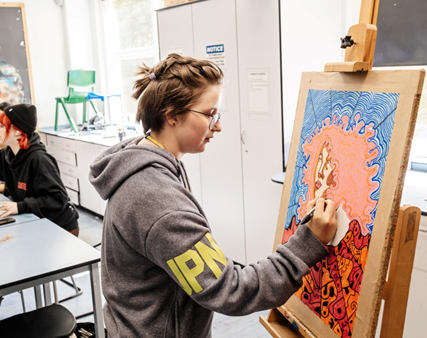
Biology
Outline of Subject:
The Biology course is a fantastic opportunity to enjoy deepening your understanding of the knowledge gained at GCSE and learn about the future applications of Biology to aspire future Biologists.
The topics are as follows:
- Biological molecules
- Cells
- Organisms exchange substances with their environment
- Genetic information, variation and relationships between organisms
- Energy transfers in and between organisms
- Organisms respond to changes in their internal and external environments
- Genetics, populations, evolution and ecosystems
- The control of gene expression
Just like at GCSE, there are required practicals which build into a separate 'endorsed' qualification at the end of the course.
How you will be assessed:
We follow the AQA Biology Specification.
The course has three summative assessments at the end of the two-year course (see above).
Paper 1 – Topics 1-4 and relevant practical skills
Paper 2 – Topics 5-8 and relevant practical skills
Paper 3 – Any content
However, you will have three key assessment points in year 12, as well as smaller end of topic tests, key pieces and quizzes.
Trips and Work Experience Opportunities:
Students enjoy a trip to Yorkshire Wildlife Park for workshops on Breeding and Conservation. We also attend workshops at Huddersfield University carrying out PCR and Electrophoresis in the labs.
Possible Career Routes:
The career opportunities available to biologists are endless, but here is a taster of some of the careers it could lead to:
Medicine (Doctor, Nurse, Radiologist, Physiotherapist, Pharmacist, Dentist, Psychologist, Dietitian, Geneticist, Pathologist, Optician, Audiologist).
Veterinary Science, Zoologist, Animal Behaviouralist, Marine Biologist. Ecologist, Environmental Scientist, Environmental Consultancy, Forestry, Agricultural Science.
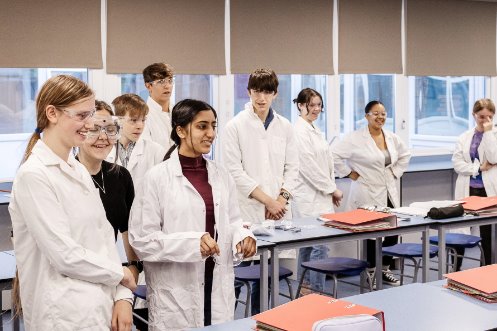
Chemistry
Outline of Subject:
The course is taught by two separate teachers; with 'Teacher 1' you will revisit the fundamentals of Chemistry at GCSE using this golden knowledge to build onto more complex theories later. 'Teacher 2' will introduce you to Organic Chemistry in more depth, a topic from your KS4 curriculum. Both will combine as you move through the course linking to each other in what we call a spiral curriculum.
There is also a heavy reliance on practical skills and there are many opportunities for you to showcase your skills. Just like at GCSE, there are required practicals which build into a separate 'endorsed' qualification at the end of your two-year learning journey. This course would be great for any student who truly enjoys Chemistry and wants to pursue it either as a career or in further education.
How you will be assessed:
The course has three summative assessments at the end of the two-year course (see above).
Paper 1 – Physical / Inorganic Chemistry
Paper 2 – Physical / Organic Chemistry
Paper 3 – Any content
However, you will have three key assessment points in year 12, as well as smaller end of topic tests, key pieces and quizzes.
Trips and Work Experience Opportunities:
At Shelley, we run the Chemistry Olympiad as an enrichment opportunity. This is a chance to explore concepts beyond what you would cover at KS5. This culminates in a very rigorous exam with the highest score from year to year being added to our school honours board.
Possible Career Routes:
- Medicine
- Venenary Medicine
- Optometry
- Dentistry
- Pharmacology
- Chemical Engeneer
- Accountant
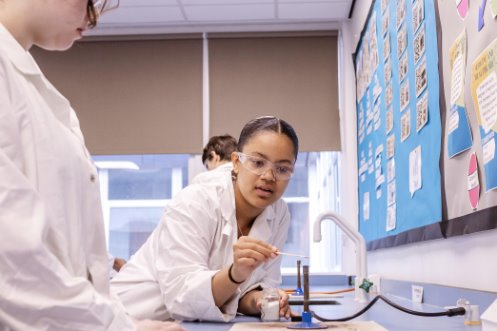
Computer Science
Outline of Subject:
Computing directly affects every aspect of our lives. As the digital world is rapidly evolving, we need new computer scientists to develop the software and hardware most of us use every day.
Component 01: Computer systems
Students are introduced to the internal workings of the (CPU), data exchange, software development, data types and legal and ethical issues.
Component 02: Algorithms and programming
Includes thinking abstractly, thinking ahead, thinking procedurally. Problem-solving and programming – how computers and programs can be used to solve problems. Algorithms and how they can be used to describe and solve problems.
Component 03: Programming project
Applying the principles of computational thinking to a practical programming project. Independently chosen by the students to focus on their interests and expertise.
How you will be assessed:
Computer Systems (exam) - 40% :
The internal workings of the (CPU), data exchange, software development, data types and legal and ethical issues.
Algorithms and programming (exam) - 40%
Using computational thinking to solve problems.
Programming project – 20%
Students will be expected to analyse a problem, design, develop, test and evaluate a program with documentation. The program must be written in a suitable programming language.
Trips and Work Experience Opportunities:
We help students gain industry experience in large IT departments in several companies.
In recent years we have run trips to Manchester Airport.
Possible Career Routes:
- Software Developer
- Network Engineer
- Systems Administrator
- Data Scientist
- Database Engineer
- IT Support
- Video game development
- Artificial Intelligence
- Information Security Analyst
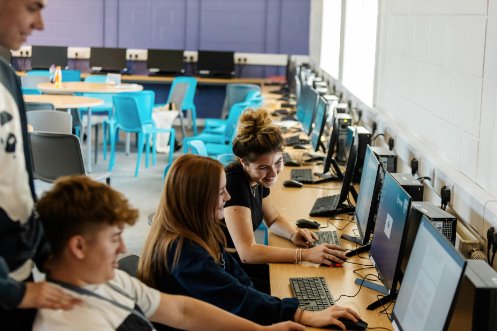
Dance
Outline of Subject:
You do not have to currently study Dance or have taken GCSE Dance. This course reflects both historical and current dance practices, making it more relevant, and inspirational for a lifelong passion and appreciation for dance. The course is a two-year course which encourages students to progress their creative and intellectual capacity as a choreographer and a performer. This specification reflects both historical and current dance practices, making it more relevant, and inspires a lifelong passion and appreciation for dance. All A Level Dance students perform in two performances a year. Students have two technique lessons a week which range from Graham, Fosse, Cunningham and Ballet technique. Students gain skills to be able to progress to the best-known universities and schools for Performing Arts in the country as well as audition for professional performance work.
How you will be assessed:
Component 1 – Performance
Students perform a solo piece and a quartet piece in a live performance exam (year 13).
Component 1 - Choreography
Students choreograph a group dance based on the stimuli set by AQA and is performed by the dancers in a live performance exam (year 13).
Component 2 – Critical Engagement
Written exam based on the Rooster (1994), American Jazz Dance and Rambert Dance company (year 13).
Trips and Work Experience:
Move It Dance conference London.
Rambert Dance Company and other performance theatre visit.
Workshop with The Northern School of Dance.
Visit Pineapple dance for a workshop on dance auditions.
External performance theatre experience.
Possible Career Routes:
- Dance Performer Choreographer
- Community Dance Practitioner Costume/Set Designer
- Multi-Media Artist
- Dance Company Education Specialist
- Dance Film
- Dance Photographer
- Dance Project Co-ordinator Dance Producer
- Dance Science
- Dance Teacher
- Pilates Instructor
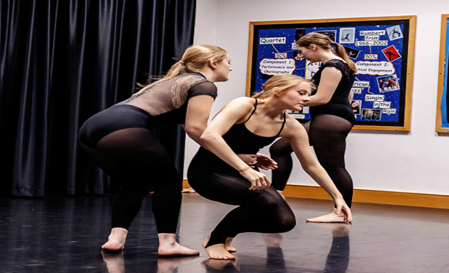
Design and Technology: Product Design
Outline of Subject:
During Year 12 you will complete a series of short tasks and projects to enhance your product making skills, develop your knowledge of construction skills and finishing techniques. You will work in a wide range of materials, including wood, metals, plastics and card, incorporating these materials into your own creative products. CAD/ CAM processes will also be used throughout the course. These projects will form part of a portfolio which will be beneficial when applying for higher education or work in the design industry. There will also be regular theory lessons to prepare you for the final exams at the end of the course. Core technical principles will be explored, including how a range of products are developed and produced in quantity in industry, functional properties of a wide range of materials, and modern developments in product design including smart and technical materials. Iconic designs will be explored including the work of prominent and influential designers, including Phillipe Starck, Memphis and Charles and Ray Eames.
How you will be assessed:
Paper 1- Technical Principles (30% 120 marks) Written paper exploring the properties of different materials and manufacturing processes.
Paper 2- Designing and Making Principles (20% 80 marks) Written paper exploring the form and function of iconic products, product analysis and commercial manufacture.
Non-Examination Assessment (NEA 50%) 45 hour project exploring the design brief of your choice.
Trips and Work Experience Opportunities:
Links with Sheffield Hallam University Product Design department.
Rotary Technology Tournament
Possible Career Routes:
- Product design
- Automotive (F1)
- Marketing / Media
- Design research
- Interior / exhibition design
- Web design
- Teaching
- Construction
- Engineering
- Architecture
- Graphic design
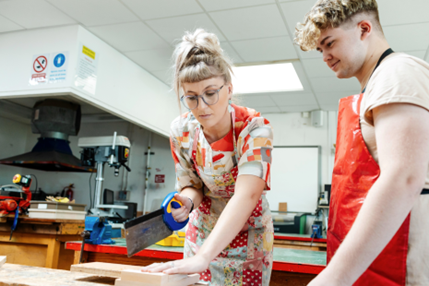
Drama and Theatre Studies
Outline of Subject:
Do I need to have studied GCSE Drama to study A Level?
No. Just a passion for the subject and some experience of performance would be beneficial.
What transferable skills does the subject of Drama offer me?
Drama offers plenty of skills that can be transferred to many other areas, including confidence building, teamwork and collaboration, time management and organisational skills, self-awareness and self-discipline, creativity and communication skills, analytical, critical and research skills, resilience and many more.
How you will be assessed:
Component One – Devising
This is assessed through both performance and portfolio
Component Two – Text in Performance
This comprises two performances:
- A group scripted performance
- A monologue
Component Three – Theatre Makers in Practice
This is assessed as a written exam. The exam has 3 sections:
Section A: Evaluation of Live Theatre
Section B: Page to Stage (Accidental Death of an Anarchist)
Section C: Interpreting a Performance Text (Lysistrata)
Trips and Work Experience Opportunities:
We run many trips to the large and small theatres of the area.
We work with companies that provide travelling workshops..
We have students working to help productions all over the local area.
Possible Career Routes:
Professional level touring work, such as musical theatre, and film and T.V. contracts. Past students have also had success in playwriting, theatre design and animation!
- Acting
- Directing
- Playwriting
- Journalism
- Teaching
- Lecturing
- Marketing
- Advertising
- Publishing
- Broadcasting
- Law & Politics
- Leisure and Tourism
- Stage and Arts management and Administration.
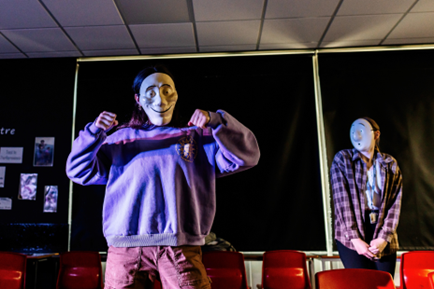
Economics
Outline of Subject:
You may have heard on the news about the state of the economy. Economics is the study of how different groups, people, firms and countries interact. We look at what happens when these different groups of stakeholders interact and the result this has in terms of prices charged by businesses and their production of goods and services; we examine these effects in the short run and in the long run. Actions and decisions taken today often have far-reaching effects into the future.
Mostly we look at what people want (demand) and what other people are willing to provide (supply). During the course you will develop a wide range of transferable skills, all of which will enhance your studies in other areas and prepare you for further study and employment.
How you will be assessed:
There are 4 themes which provide the foundations of the study of Economics.
Theme 1: Introduction to markets, and market failure.
Theme 2: Business behaviour and the labour market
Theme 3: The UK economy; performance and policies
Theme 4: A global prospective
There are 3 papers to be sat:
Paper 1: Markets and business behaviour
Paper 2: The national and global economy
Paper 3: Microeconomics and macroeconomics
Possible Career Routes:
- Economic analyst
- Management
- Business
- Entrepreneurship
- Accountancy and Finance, International Business management
- Environmental officer
- Law
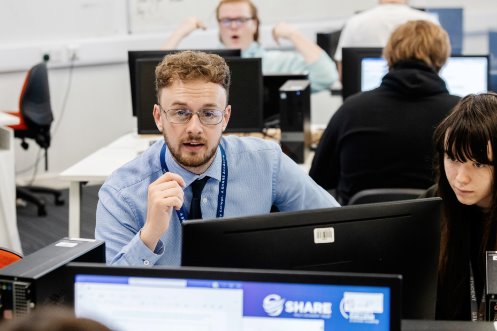
English Literature and Language (Combined A Level)
Outline of Subject:
This combined course gives you the best of both worlds in the English discipline, allowing you to study a diverse range of engaging literary texts, whilst also honing your creative writing skills. The course is carefully designed to encourage you to develop both your literary and linguistic skills in equal measure, to become a critical, confident and reflective reader and writer. These key skills are highly valued by any prospective HE provider or employer. In addition, the broad spectrum of skills covered makes this qualification a 'good fit' with almost any other qualification you might consider at this level.
This course aims to enable you to:
-
use integrated linguistic and literary approaches in your reading and interpretation of texts
-
engage creatively and independently with a wide range of spoken, written and multimodal texts, exploring the relationships between them.
-
critically analyse and explore engaging, relevant texts such as A Handmaid’s Tale by Margaret Atwood and The Kite Runner by Khaled Hosseini.
How you will be assessed:
Two written exam papers (worth 80%) and coursework (worth 20%), which is written in the second year.
Paper 1 – Telling Stories: In this paper, you'll write analytically about non-fiction and fiction texts which you will have explored in depth with your teacher. Texts studied include those in spoken, written and electronic mode, plus contemporary prose and poetry.
Paper 2 – Exploring Conflict: In this paper, you'll jump into the hotseat, transforming one of the set texts you've studied into another piece of writing, such as an account given by a particular character. You'll then step into an editorial role to explain the impact of the choices you've made.
Coursework – Making connections: This is where both the combined and creative elements of the course really shine through; you'll be given the opportunity to investigate the language used in a fiction and non-fiction text of your choosing. The possibilities here are (almost) infinite!
Trips and Work Experience Opportunities:
We will offer theatre trips to see productions of the set texts and poetry. Such as Kite Runner, A Streetcar Named Desire and even an operatic interpretation of A Handmaid’s Tale. We offer an extracurricular writing club to allow you the freedom to explore different genres.
Possible Career Routes:
This is a highly respected qualification which will stand you in good stead for a vast range of university degree choices, including criminology, history, media and film studies, psychology, fashion and marketing and… English (of course!)
Furthermore, as the course combines the academic, creative and analytical skills valued in so many professions, it is considered a competitive choice for those wanting to pursue careers in a range of disciplines, including Publishing, Journalism, Education, Psychology, Law, Advertising and Marketing.
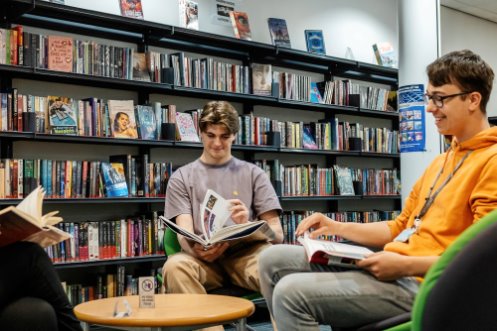
Film Studies
Outline of Subject:
You will study the key elements of film form including cinematography, mise en scène, editing, sound and performance.
You will study the contexts of a range of films and what was happening when the film was made. What can the film tell us about history and society at that time? You will also study the films in terms of the representations they present or challenge.
In year one, you study the specialist film areas of Spectatorship & Narrative. In year two you will engage in the study of Ideology, the Auteur and Critical Debates surrounding Film.
Topics include Hollywood 1930-1990, American Independent Film, British Film, European Film, Global Film, Documentary, Silent Film, Experimental Film, Short film and film production.
How you will be assessed:
Two exams at A Level that are 150 minutes long and consist of answering 3 extended response questions on Component 1, and 4 extended response questions on Component 2 (35% each).
A creative production element which allows you to showcase the film-making or screenwriting skills you have developed during the course: Short Film (video) or Short Film Screenplay (with storyboard) plus an evaluative Analysis (30%).
Trips and Work Experience Opportunities:
There are plans to offer an overseas trip to either Prague or Paris in the upcoming year.
Other trips include those to the cinema to see set texts on the big screen.
Local media firms are keen to take sixth form students for work experience.
Possible Career Routes:
Employment in the screen industries has grown by over 20% since 2009 and will substantially outpace the economy wide increase of 3% if the skills shortages in this area are fulfilled. Career paths for students of Film may include practical avenues such as Film-Making, Directing, Producing and Editing but a qualification in Film Studies also allows you to move into more theoretical pathways such as Film.
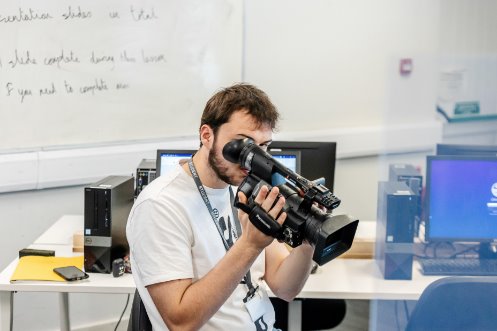
French
Outline of Subject:
Students may study all sub-themes in relation to any French-speaking country.
- Social issues and trends
- Political and artistic culture
- Aspects of political life in the French-speaking world
- Works: Literary texts and films
Students must study either one text and one film or two texts from the list.
Individual research project
Identify a subject or a key question which is of interest to them and which relates to a country or countries where French is spoken. Select relevant information in French from a range of sources including the Internet. These findings will be presented and discussed in the speaking assessment. This is part of the Speaking assessment.
How you will be assessed:
Paper 1: Listening, Reading and Writing
Paper 2: Writing (literary works)
Paper 3: Speaking
Trips and Work Experience Opportunities:
Theatre visits
Business Language Champions Events.
Trips abroad
Student exchange programmes.
Possible Career Routes:
- International Relations Consultant
- Foreign Correspondent
- Business
- Publishing Specialist Translator/Interpreter
- Cultural Events Coordinator
- National Security Agent
- Immigration Officer
- Court Interpreter
- Cultural Attaché
- UNESCO Official
- Foreign Diplomat Missionary Foreign Service Officer
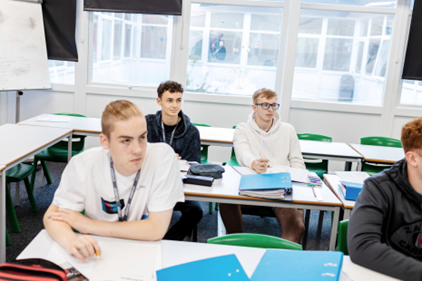
Geography
Outline of Subject:
Geography is the study of Earth and how humans interact with it; it is considered by many universities (including the Russell Group universities) as a very desirable A Level and was identified as ‘the must-have A Level’ by The Guardian.
Geography also combines well with both Arts and Sciences. The world is in a constant state of change and Geography is the subject that will help you predict and adapt to future changes in both the human and the natural world. It is the subject that looks at major issues of the 21st Century such as changes in global governance and the conflicts it leads to, the changing nature of places, the impacts of climate change and the impacts of natural hazards. It is also a subject that fosters the innovative use of both teacher-led and individual field work which assists the development of skills such as data analysis, teamwork, research skills and report writing.
How you will be assessed:
Topics Covered:
Physical: Coastal systems and landscapes, water and carbon cycles and hazards.
Human: Changing places, contemporary urban environments, global systems and governance.
Paper 1: 2hr 30 (120 Marks)
Paper 2: 2hr 30 (120 Marks)
Individual fieldwork: (60 Marks, 20%)
Trips and Work Experience Opportunities:
- Coal museum
- Sheffield (NEA Support)
- Flamborough
- Scarborough
Possible Career Routes:
- Environmental consultant
- Conservation work
- Town planner
- Disaster response coordinator
- Civil servant
- Volcanologist
- Meteorologist
- Chartered surveyor
- Teacher
- Researcher
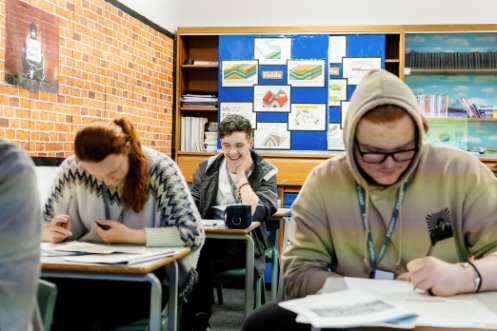
History
Outline of Subject:
History allows you to look at your own nation’s past as well as others to explain why they have developed in their particular way. The History course at Shelley allows students a taste
of social, economic and political aspects of the subject and what impact past events have had on our society today. A Level History develops an impressive range of skills which are required at university level, such as: extended essay writing, independent research, debate and discussion, explanation, evaluation, analysis and close reading of historical documents.
History can give you many skills such as:
The ability to produce strong analytical and concise essays. The opportunity to discuss and debate. An understanding of why our world is the way it is. The ability to read between the lines and infer meaning. The opportunity to work independently. History has strong links with many other subjects.
How you will be assessed:
Unit 1: Britain transformed 1918 – 1997 Written exam lasting 2 hours 15 minutes
60 marks available: 30%
Unit 2: The USA 1920-1955: boom, bust and recovery Written exam lasting 1 hours 30 minutes
40 marks available: 20%
Unit 3: Lancastrians, Yorkists and Henry VII 1399—1509 Written exam lasting 2 hours 15 minutes
60 marks available: 30%
Unit 4: Coursework Unit. “How far do you agree?” 20%
Trips and Work Experience Opportunities:
A visit to the holocaust Centre north Exhibition at the University of Huddersfield
-
An opportunity to visit Auschwitz on a day trip with the Holocaust Educational Trust.
-
A visit to the battlefields of the Wars of the Roses!
-
An overnight stay in a city of history and culture!
-
Museum visits to broaden your historical minds.
Possible Career Routes:
-
Civil Service
-
Lawyer/Solicitor
-
Journalist
-
Politician
-
Archivist
-
Archaeologist
-
Education
-
Historian
-
Writer
-
Musuem/Curator
-
Researcher
-
Any degree entry corporate route
-
International development
-
Broadcasting
-
Publishing
Mathematics
Outline of Subject:
A-level Mathematics builds primarily on algebra and coordinate geometry skills studied in GCSE Mathematics. The course contains two main strands – pure mathematics and applied mathematics, the latter of which splits evenly between statistics and mechanics. In pure mathematics, you will be introduced to new concepts such as the binomial series expansion, trigonometric equations, logarithms, and calculus. In statistics, you will learn about statistical measures, probability distributions and hypothesis testing while mechanics explores equations of motion and forces.
You will have a different teacher for each of the three strands with lessons split into:
- Pure – 5 Lessons per fortnight
- Mechanics – 2 Lessons per fortnight
- Statistics - 2 Lessons per fortnight
You will be provided with topic booklets for each new area of study that your teachers will work through with you. Providing examples as well as exercises, minimising the amount of pointless writing whilst maximising your output in lessons.
How you will be assessed:
The final assessments come at the end of year 13 and include:
2 Pure maths papers, each 2 hours long, worth 100 marks each.
1 Statistics and Mechanics paper, 2 hours long, worth 100 marks in total.
Possible Career Routes:
A level maths is often a requirement for many degree courses and higher level apprenticeships.
It can lead to careers in:
- Actuary
- Economics
- Data Science
- Engineering
- Accountancy
- Programming
- Banking
- Research
Media Studies
Outline of Subject:
As a GCE Media Studies student, you will analyse how media products use language and representations to create meaning. You will learn about the media industry and how the industry affects how media products are made. You will investigate media audiences, explore who are the people who watch, read and consume the products and consider how different people might respond to products differently, and why.
You will explore and apply critical perspectives, including those of world-renowned media and cultural theorists, and will examine how social, historical, political and economic contexts affect media production.
You will also have the opportunity to apply what you have learnt through the production of your own media texts, exploring and creating media forms such as music videos, magazines, television, websites and film marketing.
How you will be assessed:
Assessment will comprise of a mixture of examined and non-examined assessment.
Component 1
Written examination: 2 hours 15 mins, 35% of qualification
Component 2
Written examination: 2 hours 30 mins, 35% of qualification
Component 3
Non-exam assessment: Cross-Media Production, 30% of qualification
Trips and Work Experience Opportunities:
There are plans to offer an overseas trip to either Prague or Paris in the upcoming year. Other trips include those to TV studios and sets. Local media firms are keen to take sixth form students for work experience.
Possible Career Routes:
A GCE in Media Studies helps you to progress to Media, Communications and Cultural Studies courses, as well as to those in other areas such English, Humanities and Social Sciences.
Studying Media at GCE and at degree level is a route into careers such as TV and film production, advertising, journalism, interactive media, and digital marketing. It could help to provide you with the foundation to secure roles in technical production, special effects, web design and post-production.

Physics
Information coming soon
Photography
Outline of Subject:
On the A Level Photography course you will learn how to use a range of cameras to take incredible pictures. You will be taught new skills in both digital and analogue photography. The course is all about exploration, of your ideas and your vision as a photographer.
Throughout the course you will learn to print your photographs in the darkroom as well as work in Mac suites using the latest Adobe software to enhance and redefine your digital imagery. We will teach you how to produce a portfolio of individual and expressive photographs.
We offer students an exciting range of enrichment activities, including regular trips to galleries, and location shoots to help you make informed choices about your future.
How you will be assessed:
Component 1 - Personal Investigation (50%):
The creation of work based upon your chosen theme from January in Y12 until Feb in Y13. This investigation must also include a 1500 word essay.
Component 2 - Externally Set Task (50%):
This is a shorter project that runs from February in year 13 until Early May in year 13.
Trips and Work Experience Opportunities:
Gallery visits
Exhibition curation
Photography Field trips
Possible Career Routes:
- Creative industries such as photojournalism
- Fashion photography commercial photograph
- Photo editing
- Media
- Advertising
- Teaching
- Medical photography
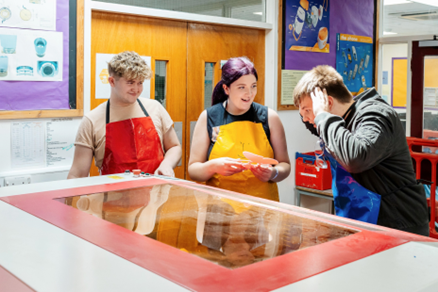
Psychology
Outline of Subject:
AS and A-level Psychology will give you an understanding of the way people think and why people behave in certain ways.
You will learn a variety of skills including analytical thinking, improved communication, problem solving and many more that will prepare you for an exciting future with the possibility of a range of fantastic careers.
You will study:
- Social influence
- Memory
- Attachment
- Approaches in psychology
- Biopsychology
- Psychopathology
- Research methods
- Gender
- Schizophrenia
- Forensic psychology
How you will be assessed:
At A-level there are three exams, each account for one third of your A-level. The three exams last 2 hours and are worth 96 marks each. The exams consist of multiple choice, short answer and extended writing questions.
Possible Career Routes:
- Marketing
- Business development
- Accountancy
- Human resources
- Forensic psychology
- Occupational therapy
- Clinical psychology
- Nursing
- Teaching
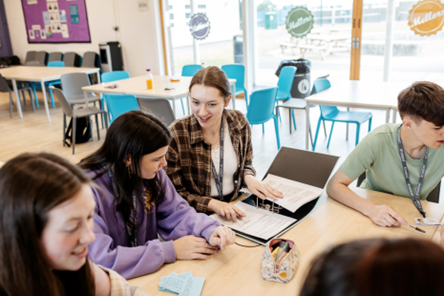
Religious Studies: Philosophy, Religion and Ethics
Philosophy, Religion & Ethics is an inspiring and engaging academic subject that creates opportunities for critical thinking as well as deepening knowledge and understanding of the world around us.
This subject gives you a thorough understanding of diverse philosophical and ethical viewpoints. Through lively and engaging classroom discussion, you have an opportunity to understand philosophical concepts, key thinkers, themes, texts and ways of thinking. It provokes challenging questions about meaning and purpose in life, beliefs about God, ultimate reality, issues of right and wrong and what it means to be human.
The content we cover is varied and interesting and will offer a new perspective and encourage you to consider issues from an analytical viewpoint using creative and critical thinking. It gives you an informed understanding of political, social and moral issues. During your studies you will cover many theories and study the works of many key philosophers and thinkers, from Plato to Aristotle, to Kant and Freud.
How you will be assessed:
Philosophy of religion
120 marks (33.3%)
2 hour written exam
Religion and ethics
120 marks (33.3%)
2 hour written exam
Developments in religious thought
120 marks (33.3%)
2 hour written exam
Trips and Work Experience Opportunities:
Supporting with the lower school debate club
Work Experience support to find appropriate placements (e.g. Law, business, etc.)
London trip
University trips
Athens trip 2026
Possible Career Routes:
Beyond fostering critical thinking and intellectual curiosity, a qualification in PRE cultivates skills highly sought after in lots of professions. Graduates often find themselves in careers such as law, journalism, education, business, and public policy. The ability to analyse complex issues, articulate compelling arguments, and engage in interesting discussions help you to thrive in roles that demand clarity of thought and effective communication. You will be prepared for success in a rapidly evolving job market, making philosophy not just a field of study, but a foundation for a choice of careers. These include:
- Business analyst
- Civil Service
- Human Resources Officer
- Local government officer
- Marketing executive
- Journalist
- Policy officer
- Recruitment consultant
- Social researcher
- Solicitor
- Lawyer
- Teacher
- CEO
- Policy Writer
- Copywriter
- Politician
- Managerial positions
Sociology
Outline of Subject:
Sociology is the study of society, the ‘social world’. Sociology looks beyond day to day and asks what is the real nature of society, why does it function like it does and for whose benefit? Sociology asks you to understand and apply key concepts such as power, gender, ethnicity and culture to important and topical issues such as family, education, crime, deviance and religion, which shape the world we live in.
Sociology is a rigorous academic subject that is also rooted in the real world. Studying Sociology A-level enables you to develop critical thinking skills, to analyse and interpret the world around you.
The independent study skills learnt in Sociology are excellent preparation for university and for career paths.
How you will be assessed:
The A Level covers 4 topic areas. The first two modules are studied during year 12 and modules 3 and 4 are studied during year 13.
Module 1 - Education with Theory and Methods
Module 2 - Families and Households
Module 3 - Crime and Deviance
Module 4 - Beliefs in Society
Paper 1— Education with Theory and Methods.
Paper 2— Families and Households and Beliefs in Society
Paper 3—Crime and Deviance with Theory and Methods
Possible Career Routes:
- Social worker
- Teaching
- Nursing
- Probation service
- Human resources
- Policy officer
- Forensic scientist
- Public relations officer
- Police officer
- Newspaper journalist
- Family support worker
- Market researcher
- Youth worker
- Marketing executive
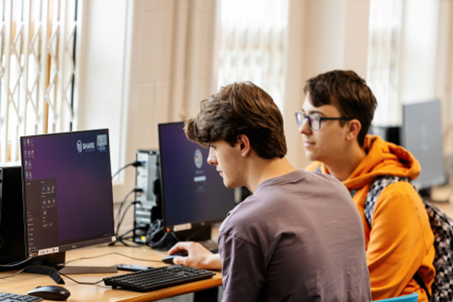
Spanish
Outline of Subject:
Students will study all sub-themes in relation to any Spanish-speaking country.
- Social issues and trends
- Political and artistic culture
- Aspects of political life in the Spanish-speaking world
Works: Literary texts and films
Students must study either one text and one film or two texts from the list.
Individual research project
Identify a subject or a key question which is of interest to them and which relates to a country or countries where Spanish is spoken. Select relevant information in Spanish from a range of sources including the Internet. These findings will be presented and discussed in the speaking assessment. This is part of the Speaking assessment.
How you will be assessed:
Paper 1: Listening, Reading and Writing
Paper 2: Writing (literary works)
Paper 3: Speaking
Trips and Work Experience Opportunities:
Theatre visits
Business Language Champions Events.
Trips abroad
Student exchange programmes
Possible Career Routes:
- International Relations Consultant
- Foreign Correspondent
- Business
- Publishing Specialist Translator/Interpreter
- Cultural Events Coordinator
- National Security Agent
- Immigration Officer
- Court Interpreter
- Cultural Attaché
- UNESCO Official
- Foreign Diplomat Missionary Foreign Service Officer
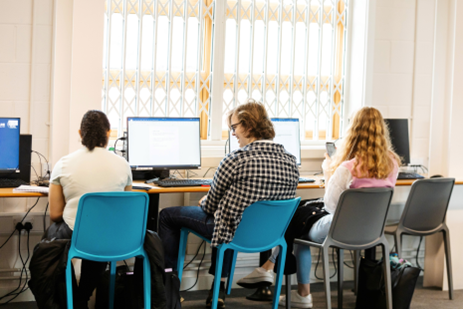
Textiles
Outline of Subject:
Textiles is not only a vastly creative subject in which anyone can discover their passion, it is also one of the UK's leading industries. It allows ideas and concepts to become reality, combining the personal expression of the art world with the fast-paced passion of the fashion industry. Throughout this, you will experiment with a wide range of textile fabrics and techniques including pattern drafting, fabric manipulation and decoration. You will research, explore, develop and refine your own concepts and passions into professional standard products. You will have the opportunity to create at least one extended collection of work based on an idea, concept, theme or issue of your choosing. This course is highly practical with a focus on manufacturing and designing to the highest standard.
For both components, you will produce sketchbooks filled with notes, research and textile sampling inspired by the work of textile artists and the surrounding environment.
How you will be assessed:
Component 1: Personal Investigation
- No time limit
- 96 marks
- 60% of A-level
Component 2: Externally set assignment
- Preparatory period + 15 hours supervised time
- 96 marks
- 40% of A-level
Trips and Work Experience Opportunities:
Knitting & Stitching show, Harrogate.
Huddersfield University degree shows.
Possible Career Routes:
- Fashion Design
- Textiles Design
- Graphic Design
- Costume Design
- Interior Design
- Fashion Merchandising and Buying
- Advertising and Marketing
- Fashion Journalism
- Set Design
- Teaching
- Art Therapy
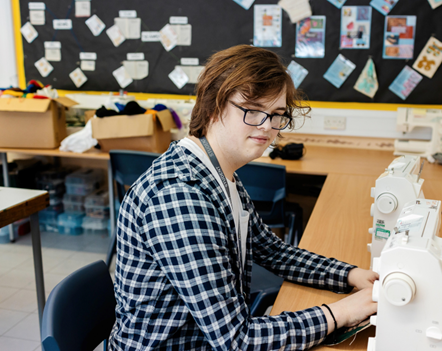
Applied A-Level
Applied Science
Outline of Subject:
You can also combine Applied Science with arts or humanities subjects.
Another attractive feature is that it combines Biology, Chemistry and Physics in one qualification and provides an entry point to vocational Science careers. If you enjoy researching information for yourself and organising it into a really good piece of coursework.
If you are well-organised and good at meeting deadlines, and if you want to do Biology, Chemistry and Physics but not as separate qualifications, then Applied Science may well be a good choice for you.
How you will be assessed:
The course is set and outlined by OCR.
You will complete 2 written papers, each 2 hours in length, covering units 1 + 2.
You will complete and hand in 3 coursework units that will be internally and externally assessed.
Your overall grade will be determined through a combination of the above.
Trips and Work Experience Opportunities:
In recent years we have had trips visiting Yorkshire Wildlife Park and a local brewery in Skelmanthorpe that allow students to speak with people in science-related careers and have hands-on experience with course content.
Possible Career Routes:
Medical, scientific or sports based. Some examples are: radiography, biomedical science, nursing, sports science, law and occupational health.


